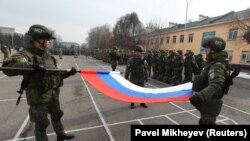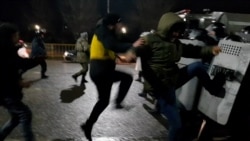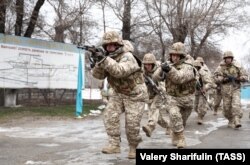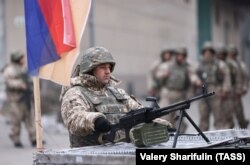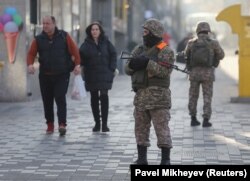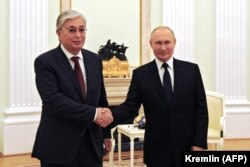The Collective Security Treaty Organization’s roughly 2,300 peacekeeping troops may now be leaving Kazakhstan, with Kazakh President Qasym-Zhomart Toqaev’s power assured, but some Russian and Kazakh analysts believe that Russian President Vladimir Putin is the ultimate “beneficiary” of their operation.
“Putin wins here because he demonstrated to the world – first of all, to the West – that the CSTO has stopped being a paper tiger,” commented Arkady Dubnov, a Central Asia specialist at the Carnegie Moscow Center. “This isn’t a toy.”
The deployment of troops from Collective Security Treaty Organization (CSTO) members Armenia, Belarus, Kyrgyzstan, Russia, and Tajikistan marked the first implementation of the military alliance’s mutual-defense mechanism.
Russian special forces, assault, and airborne troops, who made up the bulk of the mission, began arriving in Kazakhstan on January 6, shortly after President Toqaev had requested the bloc’s assistance in overcoming what he termed “an act of aggression” against the state -- street violence that erupted on January 5, killing 18 security officers and wounding nearly 750 others, according to the government.
An official number has not been released for the number of civilian casualties.
The Kazakh leader blamed the violence, located primarily in the southern commercial hub of Almaty, on “foreign-trained terrorists,” part of a supposed attempt to overthrow the government. The origins or connections of these alleged “terrorists” have not been specified.
The rampage, in which government buildings were attacked and set alight, followed three days of peaceful protests against higher liquefied petroleum gas prices.
The presence of CSTO peacekeepers, who guarded “critically sensitive” public facilities like airports, enabled Kazakh security forces to conduct “special operations” against suspected “terrorists," Kazakh and Russian officials say.
But almost as soon as it had begun, the CSTO’s maiden peacekeeping mission was over.
On January 9, Toqaev declared that public order had been restored. Two days later, he announced a withdrawal of the CSTO peacekeepers as of January 13.
Despite some analysts’ expectations of a prolonged pullout, the Russian Defense Ministry confirmed on January 13 that the first Russian peacekeeping troops had begun leaving Kazakhstan via four IL-76 military transport planes, as scheduled.
On January 14, Russian military planes flew home Armenia’s 100 troops and Belarus’ 100 to 300 troops. Similar flights will return Tajikistan’s 200 troops. Kyrgyzstan, Kazakhstan’s southern neighbor, is overseeing the withdrawal of its own 150 troops.
The “remaining” peacekeeping troops will be withdrawn over the following five days “as they hand over facilities,” Russian Defense Minister Sergei Shoigu said. Shoigu did not identify these facilities.
He set January 19 as the pullout’s tentative completion date.
“I think that Putin didn’t realistically count on such a fast pullout of the troops,” commented Dubnov. “It doesn’t work that way. Millions of dollars are spent on this redeployment.”
The operation officially involved “more than” 70 IL-76 and five AN-124 Russian military transport planes executing 108 flights.
But Dubnov believes that the mission’s cost “isn’t significant for Putin.”
Rather, long-term benefits could be in the offing. Former Putin aide Gleb Pavlovsky, a political scientist, termed the deployment to Kazakhstan “an ideal – from Putin’s point of view – preamble for talks with the West” about halting NATO’s eastward expansion, including into Ukraine.
The goal is to present the Russia-led CSTO, of which Ukraine is not a member, as a force for regional stability.
In a televised tete-a-tete with Defense Minister Shoigu on January 13, President Putin praised the CSTO troops for helping to restore order and thereby freeing up Kazakh soldiers and law enforcement to conduct “special operations” within the country.
“This will allow the leadership of the Republic of Kazakhstan to resolve socio-economic, political issues freely, calmly, in dialogue with the public,” Putin said. “This is very important.”
Apparently, this is also a potential model for the future. Putin declared that further study should be made of using Russian troops within CSTO peacekeeping missions.
But some analysts believe that, more specifically, the CSTO’s Kazakhstan mission enabled Toqaev to shore up his own power against a challenge from within the Kazakh security forces.
Toqaev “needed the troops not to carry out police functions, it seems to me, but to demonstrate to his own security forces who’s the boss in the house,” commented Russian political scientist Dmitry Oreshkin, who believes Toqaev’s claims of an attempted coup.
“When the CSTO troops entered Kazakhstan, all the local security forces understood who, in reality, controls the situation,” Oreshkin said.
The former head of the National Security Committee, Karim Masimov, and "other figures" who worked for the intelligence agency have been detained and charged with treason.
Overall, Kazakhstan has detained up to 12,000 people to date for alleged connections to the January 5-6 violence – a figure that recollects Moscow’s own crackdowns on unauthorized street protests it saw as challenging government authority.
But Kazakh political scientist Dosym Satpaev contends that Toqaev turning to Putin for help with his political problems was a mistake. Toqaev’s decision means that Kazakhstan’s “traditional, multi-vector policy” toward regional players “has passed into history," he said.
“Now, Kazakhstan’s leadership will [resolve] many issues connected with the domestic and foreign policy of Kazakhstan with an eye on Moscow,” said Satpaev, director of the Kazakhstan Risks Assessment Group.
Oreshkin conjectured that, for that reason, Putin wants to ensure “his own people” -- Kremlin-friendly Kazakhs -- are either in official posts or “close to” the government before withdrawing Russia’s CSTO troops.
Nonetheless, Toqaev, a former Kazakh foreign minister, Soviet diplomat, and a graduate of the prestigious Moscow State Institute of International Relations, already has long-standing ties with Moscow and Russian officialdom.
Those ties to Russia also apparently extend to family business interests, an extensive investigation by Current Time and RFE/RL’s Russian Service has found.
With this background, little suggests that Putin sees Toqaev as an unknown entity. In a December 23, 2021 press conference, the Russian president, describing Kazakhstan as one of Russia’s “closest allies,” said he had “very close and friendly” relations with the Kazakh leader.
Yet amidst unease among many Kazakhs over what is perceived as ongoing Russian disrespect of their territorial rights, that closeness to Russia could also prove a political liability.
Russian political analyst Leonid Gozman, an opposition politician, believes that fear of Kazakhs' dissatisfaction with the CSTO peacekeepers may have prompted Toqaev to call for their withdrawal.
Foreign Ministry spokeswoman Maria Zakharova, however, on January 13 rejected any criticism of a “Russian occupation of Kazakhstan.”
Russia sees Kazakhstan as “a sovereign, independent state” that can be assisted and with whom it is possible “to develop relations, help,” Zakharova said.
That, precisely, is the point for Central Asia expert Dubnov.
“It will always be able to put [a CSTO peacekeeping mission] into action when he considers this necessary ….” he commented, in reference to Putin. “The beneficiary, all the same, will remain Moscow, independent of the situation in Kazakhstan. “
-With additional reporting from Interfax and TASS




